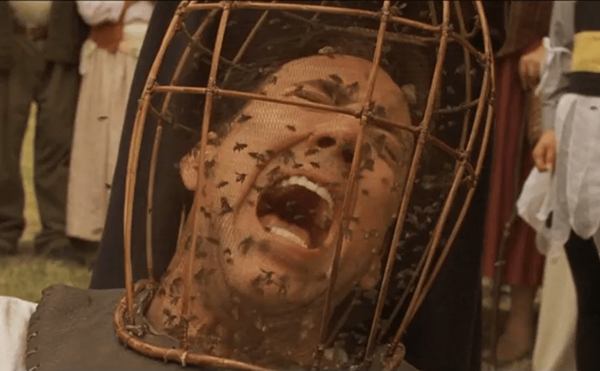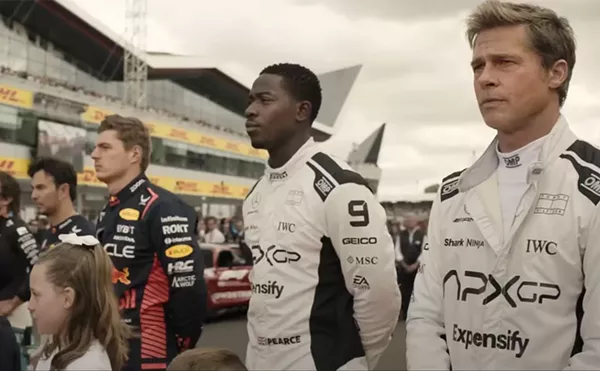
Audio By Carbonatix
[
{
"name": "GPT - Leaderboard - Inline - Content",
"component": "35519556",
"insertPoint": "5th",
"startingPoint": "3",
"requiredCountToDisplay": "3",
"maxInsertions": 100,
"adList": [
{
"adPreset": "LeaderboardInline"
}
]
}
]
You may have seen him in recent television spots for the Michigan Economic Development Corporation, touting the Mitten State as a good place to start a business. Or you may have caught him at a local venue, strumming his acoustic guitar and singing original folk-blues tunes. If not there, then surely you saw one of the 53 motion pictures he's appeared in. Maybe Terms of Endearment, The Purple Rose of Cairo, Dumb and Dumber, Pleasantville or The Squid and the Whale.
Actor, playwright, activist, musician and proud Michigander, Jeff Daniels, keeps his creative plate full. Daniels is a founder of Chelsea's non-profit Purple Rose Theatre. He has written about a dozen plays that have been produced there since its grand opening in 1991, including Escanaba in da Moonlight and Escanaba in Love, both endearing yet zany send-ups of life in Michigan and the U.P. His newest play, Panhandle Slim & The Oklahoma Kid, is currently running at The Purple Rose till August 30. But this week he also comes to the Detroit Film Theater for a special engagement, performing for one night only with Sigourney Weaver in A.R. Gurney's Pulitzer Prize-nominated play, Love Letters.
On a recent afternoon, the 53-year-old actor appears at ease in his modest office at the Purple Rose. He's just come from a local golf course and is wearing a Detroit Tigers t-shirt. Sitting at his antique pigeon-hole desk, Daniels discusses his current shows, his career and what's been driving him non-stop all along.
Metro Times: You're a very successful actor. But in recent years, you've ventured into writing songs and performing music. Why now?
Jeff Daniels: I don't know. There's probably a year's worth of therapy needed to find out why having success in one area isn't enough. It's exhausting. My wife Kathleen says, "So what's next, tap dancing?" I'm playing guitar, and I want to learn harmonica. And by the way, I'm learning to play the blues piano right now, too. But there's some creative thing that just won't shut down. I like to think the creative whatever in me won't turn off. So it's nice to channel it in some direction versus alcohol or drugs. If I'm going to be addicted to something, let's be addicted to creativity.
MT: There's something challenging and daring about going off into a new direction.
Daniels: Yeah. And I think in film in particular. Once you've done as many films as I have, you're limited by the opportunities you're given. And sometimes you just do a film to make some money this year, or to stay in the business, or because it's good for the career. You're not challenged whatsoever. I think there were a lot of films in my career, My Favorite Martian and things like that, where you show up, pull out your bag of tricks, and try to make it work. Then you go back to the hotel and work on the second act of that play that's really hard to do.
MT: Could it just be a love for a lot of different art forms that drives you?
Daniels: There's also a goal line, a finish line. You know how good it is when you do it right, or you've seen people who've done it really well. And you want to get under the hood and see how Lanford Wilson wrote The Hot L Baltimore. You want to figure that out. When I was on the set with Woody on The Purple Rose of Cairo [which he named his theater after], I was fascinated by his daily rewrites of what we were doing. I wanted to figure out the why. Why is he rewriting that? Why is he cutting that? It's the same thing with the guitar and the music. What is it that will make people walk out going, "God, I can't wait to see him again." What is it that I have to do creatively to get that?
MT: Was the same thing at work when you wrote the comedy Panhandle Slim & the Oklahoma Kid?
Daniels: The idea for that play came from a play called Stones in his Pockets. I saw it in New York. It was written in Ireland. Two Irish guys are playing extras on the set of an American movie. They end up playing 15 characters. As one guy is trying to get some breakfast at the catering truck, the other guy walks behind him and becomes the star actress from America. He walks behind the first guy and becomes the assistant director, instantly changes. And they did that for 15 different characters. I loved it. It was so theatrical. So I decided I wanted to do a play for two people.
MT: But it went through some rewrites.
Daniels: One got to page 80, but it was an 80-page SNL sketch. It went on forever, and it didn't add up to anything. But I was still chasing the two actors idea. So I went off in November (2007) to do the Marlee Matlin movie (Sweet Nothing in my Ear), which was all-consuming because of the sign language. Then I had three weeks of music gigs in January, where I just toured. And as I drove through the prairies of Oklahoma, things started to add up.
MT: You were ready to write the play?
Daniels: By the time I got off the road after those three weeks, I had thought the whole play through.
MT: You also wrote several songs for the play?
Daniels: Yes. But it's not a musical. That's why we call it a play with music. It's 1894 on the prairies of Oklahoma. And there's a singing cowboy, who shows up with a guitar. There are eight songs in the play. Two are from somewhere else. One is a hymn I found that was written in the 1890s. Another is a bluegrass jig by a great Michigan band called Steppin' In It. The other six songs are mine. One I wrote in, like, '78.
MT: 1978? So you're not new to songwriting.
Daniels: It's a diary. Good, bad or ugly, these songs went into a notebook. There are 400 of them. A lot of them are not good, but "Sleepless Nights" worked. We found a use for a song that probably would've just stayed in a notebook.
MT: Why did it become important to put out the CDs?
Daniels: Fundraising. That was the initial reason. That's also why we do the unplugged shows [at the Purple Rose Theatre] Christmas week and New Year's week. I said, we're dark for those weeks between shows, and I know there are people all over the place. We learned that when we did Escanaba [in da Moonlight] at the Gem. Those were two of our biggest selling weeks. Out here at the Purple Rose, the lights are turned off. So let's put something cheap in. And they said, why don't you take out your guitar, celebrity boy, and we'll sell tickets to a train wreck? And that's what the first show was, a train wreck. I had flop sweat. It was the scariest thing I've ever done.
MT: Normally, a person who's very accomplished in one way is in a very safe place, because they're recognized and established. But you get on stage and do something that makes you sweat.
Daniels: You learn. Now I can go out, and it doesn't matter. I played the Whiting Auditorium in Flint to 2,000 people. Four balconies were full. I walk out there with my guitar, sit down and plug in, and go, man, I wish there was a band. It was a Saturday night in Flint with a bunch of people who wanted to have a great time, and we did.. Not a drop of sweat. By taking the risk you grow and get better. Ideally it informs everything else you do. The music I've done over the past seven years or so has made me a better playwright and stage performer. If you can walk out with a guitar and hold an audience for 90 minutes without a band, you can walk out on opening night and stare down The New York Times.
MT: Your CD, Grandfather's Hat, and many of your plays really celebrate small town, everyday life. What attracts you to those kinds of themes?
Daniels: I really want to write for the people who are sitting in our audience. Plus, it's what I know having grown up here.
MT: And staying here?
Daniels: Yeah. And being from the Midwest and trying to explore what that means.
MT: How has living here as opposed to moving to, say, Los Angeles, affected your career?
Daniels: I broke rules and hurt the career by moving here, by getting married, by having kids. That's not sexy. It's not glamorous. And you certainly don't do that if you want to be a dangerous, mysterious, A-list movie star. So as far as that whole Hollywood mystery and dangerous stuff goes, I wasn't doing that. At the end of the day, that costs you money. It costs you roles.
MT: You don't sound like you regret it.
Daniels: Maybe that's because I'm doing all these other things. Somebody told me a long time ago, the acting won't be enough for you. And it wasn't. I bore real easily on a movie set. It's even harder nowadays, because the only good scripts are the indies. That's where the writing is. That's where the challenges are. You get into the big studio movies, which are written by a committee of people who are also in marketing, and what are we doing? You get into your fifties and you just don't care anymore, and you want to do other things.
MT: Having a family and living here didn't stop you from becoming a very successful actor though.
Daniels: We moved here because of the family, because of the kids. This is where we wanted to raise them. This is where we wanted to live. I fully expected the career to end. It was fatalistic, but also realistic. Careers don't last. They don't last in the movies.
MT: Sounds like you took some real risks. What gave you the confidence to make your career your own way?
Daniels: Certainly growing up in a home that stressed humility. But Hollywood can kill that in an instant. Circle Rep [Circle Repertory Company, New York] did it. That's where I learned there's really an art to what you do. And I go back to the two guys, Lanford Wilson and Marshall Mason. When they knew I was leaving Circle Rep and I was really going to chase the movies, they knew there was going to be a career there. The first thing they said was please come back. Don't be like some people and just leave and never come back and do a play for us. But they also said, make it all count.
MT: Those are real words of wisdom.
Daniels: When I went out to L.A., I had that in my head. I would sit with these people [in L.A.] with one foot still in Circle Rep in New York City. And I would see all the gold chains, and the producers, and all the people who talked like they knew what they were doing. And yet I had worked with a guy who'd won a Pulitzer Prize [Lanford Wilson], so I tried to gravitate toward the really good people, the Woody Allens, Jim Brooks. … When you've worked with people like that, it's hard to get really excited about doing a television sitcom.
MT: You'll be back on the stage in July with Sigourney Weaver in Love Letters. How do you feel about the play?
Daniels: These two people are reading these letters over the span of their lifetimes. On paper, Love Letters shouldn't work. But it works, and I was kind of stunned by that.
MT: How did it come about that you'd do the play in Detroit?
Daniels: Sigourney (Weaver) and I did an independent movie years ago called Imaginary Heroes. She has a theater company in New York called the Flea Theater Company, and she called last spring when I was there and said "Can you do Love Letters with me? We'll raise some money for the Flea Theater." I said, "OK, I'll do it for you if you do it for me." So we're going to do what we did in New York. We're just basically airlifting it and transporting it to the DIA.
MT: Why did you choose the DFT?
Daniels: Casey Granton, our development director, really wanted to bring it to Detroit. I think her first choice was the DIA. We're really trying to bring an awareness of The Purple Rose to Detroit and to Oakland County, letting all the arts supporters know that we're a nationally recognized theater company. I hope people will take a look at us as a theater that should be supported and should be sustained.
Love Letters runs at 7 p.m. on Saturday, July 26 at The Detroit Film Theatre inside the Detroit Institute of Arts with Dinner with the stars immediately following. For tickets to either play, visit www.purplerosetheatre.org or call 734-433-ROSE.





